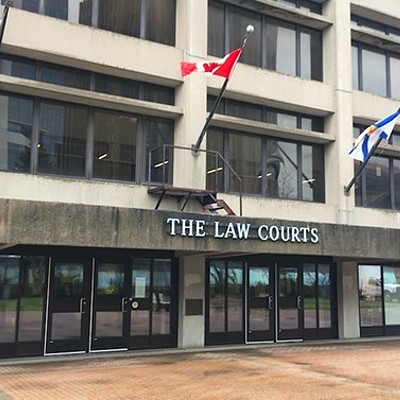Chris Dabrowski says he’s afraid he’s on the hook for $26,000—money that the computer science student doesn’t have because he didn’t have tenant’s insurance during an accidental fire set by his roommate three years ago.
That’s about one-third of the amount Dabrowski’s former landlord, Jay Abbass, is seeking as subrogated costs he incurred to fix the property at 1535 Edward Street—that is, costs which weren’t covered by Abbass’s insurance company.
Last May, Canada Direct Trading Limited, owned by Jay Abbass, which lists Cooke Sales on Gottingen Street as its civic address with the Registry of Joint Stocks, sued all four tenants of the apartment for negligence, citing statutory condition four under the Residential Tenancies Act: “The tenant is responsible for the ordinary cleanliness of the interior of the premises and for the repair of damage caused by willful or negligent act of the tenant or of any person whom the tenant permits on the premises.”
Dabrowski says his roommate Martin Day, whose unattended candle caused the fire, declared bankruptcy after the blaze forced all four out of their south end apartment. Roommates Mike and David Lovas’ parents’ insurance policy covered their loss—and, according to Mike Lovas, it’s also protecting them in this suit.
“My point of contention is the law is very hard to deal with if you’re not well-off, and you’re not prepared to declare bankruptcy,” says Dabrowski, whose friends have launched a fundraiser so that he can mount his own legal defence: they’re selling T-shirts printed with the student’s likeness a la Che Guevara and, in a rodeo-style font, the phrase Free Chris Dabrowski. He figures that they’ve sold or given away about half of the two hundred T-shirts printed.
Dabrowski says the stress of the suit is one reason he’s returned to Halifax on a leave of absence from the University of British Columbia, where he’s now enrolled in a Masters degree program. He’s spent much of his time back in Halifax preparing a cross claim which he filed on December 23.
“You’re not really encouraged to defend yourself, and it’s hard to find free legal advice ,” he says. “But I can go down to the Courts into a little room where I can read cases—though I can’t take files out of the room, so I have to pay 65 cents per page, instead of three cents at Kinkos.”
Philip Chapman, lawyer for Canada Direct Trading, did not return phone messages.
Marlene Landry of the Insurance Bureau of Canada says that a subrogate claim “usually happens fairly soon” after a fire so that the file can be closed.
“Liability is the word,” says Landry. “Not all tenants are required to have tenant’s insurance, and if they don’t, then it becomes a suit against the person who caused the fire or all tenants.”
No tenant is required to have insurance, according to Service Nova Scotia. The Nova Scotia Residential Tenancies Act says tenants like Dabrowski and his roommates are responsible to insure their own belongings—meaning the landlord’s policy doesn’t protect them—and their landlord may request a copy of that policy, but the landlord cannot require that a tenant have insurance.
Standing in front of his old home, Dabrowski, wearing an old parka and toque, scratches his head and looks at the three-storey Victorian house with its new siding and windows in wonder: “This house never looked this good; it was in terrible, terrible condition when we first rented it—you know, typical student housing. had a superintendent we called when things broke, but he was always slow to fix the stove, the dishwasher.”
Dabrowski maintains he was a conscientious tenant who attempted to put out the January 2003 fire with a blanket and a fire extinguisher before calling 911—“The smoke alarms didn’t go off,” he says. After the fire, relations with Abbass were on rocky ground, Dabrowski says, but he and the Lovases reluctantly fulfilled their lease the following summer and moved back into the newly renovated house—with its new bedroom, kitchen, bathroom, and floors. In September, they never received their security deposit back or an explanation about why it was withheld, which is required under the Tenancies Act.
“Best case scenario, my case will change the law which holds tenants responsible for a roommate’s mistake,” speculates Dabrowski, who says he’s sticking around Halifax until the suit is resolved—even though it’s a case that’s likely to drag out, possibly for several more years.
“Or maybe it should become mandatory that tenants have insurance. I don’t know.”

















